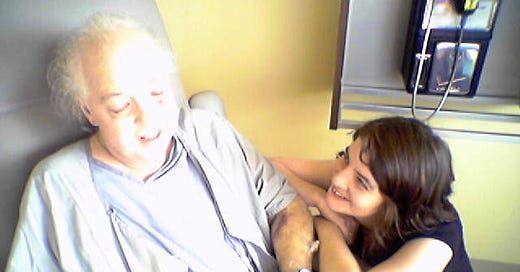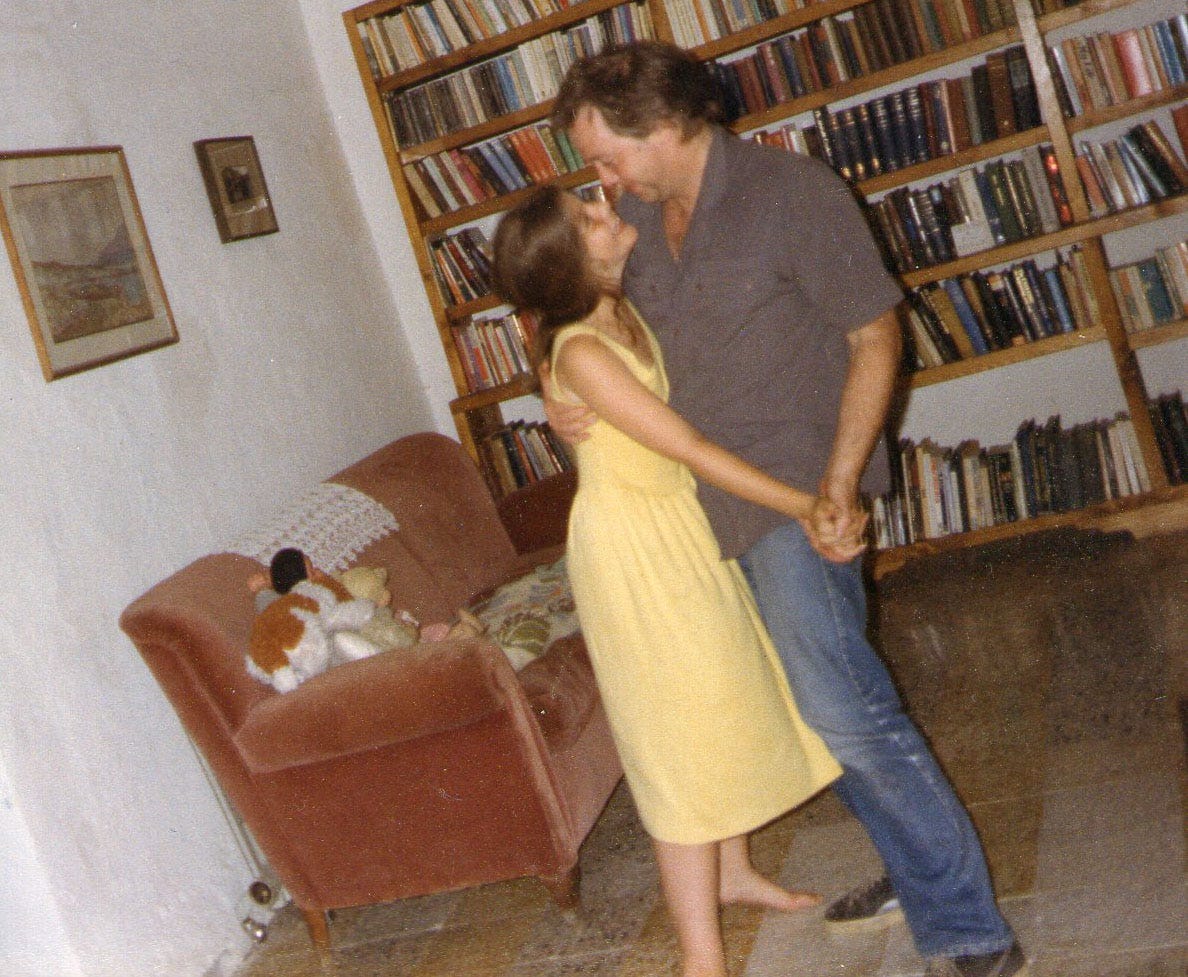How my atheist father's death led me to belief
It seems very obvious to me now that atheism is a rational and understandable position to take, but it is a luxury belief.
Last Tuesday marked 20 years since the death of my father, Jack. It seems an impossible length of time to have passed without his presence, his wit, and his warm guidance. An entire lifetime.
I always aspired to be like my father. When I was a teenager and a young woman, I thought he had the coolest job. Though when I was a child, I wished that he would write children’s books — books I could read — instead of writing sex drenched novels about debauched Romans and Celts. He had a gentle spirit and a slightly mischievous sense of fun, so I was almost always happy to be in his company.
For more about him and to read a few of his poems, you can read this.
As a result of this close bond, his worldview shaped mine. He was deeply anti-clerical, having grown up in a time and place where priests held so much sway they were given license to beat children or take them away from their mothers. He worshiped Isaac Newton, Copernicus, and Darwin, and shuddered at the superstitiousness of religion in his parents’ generation.
Last year, at a family funeral here in Belfast (my father’s hometown) an older gentleman came up to me and asked if I was Jack Holland’s daughter. I said yes, and he told me that he was in the same class in school as my dad when they were young teens. One day, he told me, after a religious lesson about the Holy Family, my father came up to him and announced, insouciantly: “That’s all made up, you know.” The older gentleman laughed recalling how shocked he had been that anyone — much less another school boy — could say anything so bold.
One spring day in 2004, when he was in hospital in Manhattan, very ill and only a few weeks from death, I was alone with him when he suddenly asked, apropos of nothing in particular: “What comes next? Unknown territory.”
I agreed, somewhat hesitant, as I was taken aback at this sudden turn toward open-mindedness about an afterlife, after a lifetime of militant atheism. But I recognised the moment as being one of grave import. Being young and callow, I did not think to ask him what he meant, or what he was seeing in his final days on earth, that prompted such a question. I just patted him on the hand and murmured something noncommittal.
Regular readers will know that the madness we are collectively witnessing right now has caused me to consider God as a possibility for the first time in my life. I’ve written about it here and here. So I often wonder, would my father be horrified at my sudden acceptance of Christianity as a far better alternative to liberal modernity? Or would he — like me — look around at the lunacy of our time and think — ‘we got this atheism thing wrong.’
It seems very obvious to me now that atheism is a rational and understandable position to take, but it is a luxury belief. In a time of war, you don’t contemplate soon becoming worm food, you look for salvation and transcendence. But this time 20 years ago, life was very much how it had always been and how I thought it would always be — our woke nightmare had not yet begun, there were no mothers agreeing to desex their sons and remove the breasts their daughters. Liberals were normal.
Then, the night before he died, I had a dream which, it turns out, planted the seed of belief in me. That is because there is no other possible explanation for the dream, other than my soul was in touch with a higher plane of consciousness and I was receiving messages from the great beyond.
When my father was diagnosed with cancer in March of 2004, I was living in Rhode Island where I had a job at a newspaper. Knowing that his disease was fatal and it was a only a matter of time before he was gone, I had taken a leave of absence from work and was spending my time in New York, where my parents lived, and where my father was hospitalised in upper Manhattan.
On what turned out to be the last day of my father’s life, I had gone to visit him as usual and he was in good spirits and in strong form. He was brighter and less sick than he had been since going in to hospital, about a month before. So I decided it would be safe for me to return to Providence for a night, to go to a work function. On the bus trip north from New York City, I was full of optimism about my father’s condition. In a phone conversation with a friend, I shared my optimism. “He seems to be really improved,” I told him. “I think he might even live a whole year.” Where I got this prognosis I have no idea - I made it up out of whole cloth. In April, the doctor had been unequivocal, he had, at most, three months to live.
I chatted with my father briefly on the phone that Thursday evening, a conversation that I paid no attention to whatsoever, so confident was I that I would be seeing him again within a day or so. And then I went to bed.
The next morning — Friday — I was woken from a dream by the phone ringing in my apartment. The dream had been going on for some time. It had begun as an aerial shot, panning over a beautiful vista of green fields interspersed with canals of clean, placid blue water that sparkled in the sunshine. This was unusual for me — throughout my 20’s, my dreams were characterised by stormy weather, rough seas, dark skies and me clinging to rocky surfaces as winds buffeted around me.
Then, I found myself in a house, with my parents. As we went from room to room there was a guide with us. My thought in the dream was: “What an interesting world my parents have shown me.” Then, suddenly, the dreamscape shifted again. This time, my parents stood with an editor from the BBC, and they were all on the George Washington Bridge. (The hospital where my father was treated overlooked it.) The three of them stood there, while off to the side, I was hanging — literally — off a cliff. I could see them if I turned my head. I felt no panic, I made no effort in clinging to the rock face. I was just - there. I was calm. And then the thought came to me, fully formed: “I have to let go. I have to let go. I have to let go.”
At that moment, as the voice was telling me to let go, the phone woke me. It was my mother. My father was in the process of dying. I quickly packed some funeral clothes and got in the car, my then-boyfriend driving. My father was dead by the time we reached southern Connecticut.
This dream guided me in my grief following my father’s death. It comforted me and gave me peace. I was slightly haunted by how this could have appeared in my mind when my rational brain was telling me he might live another year. But it was a message from him, to me, from his onward journey.
The dream opened up a world of possibilities to me, a recognition of being surrounded by things unseen and unexplainable through the lens of material reality. And though it would take another twenty years, and a lot of hard-won understanding, and a world gone mad, before I truly understood the perspective of those who feel God’s presence, I see now that dream was the first step on my own journey to belief.








I lost my father 19 years ago. I've been a (reasonably) militant atheist for most of my adult life, but like you, am seeing the poison fruit of that belief system playing out in our society and am looking for something else .... and finding it.
It's great to read about your spiritual journey. Never forget that there is a big difference between Jesus Christ as revealed in scripture and institutional religiosity which can be and often is badly done. As scripture says, "For I am convinced that neither death nor life, neither angels nor demons, neither the present nor the future, nor any powers, neither height nor depth, nor anything else in all creation, will be able to separate us from the love of God that is in Christ Jesus our Lord." (Romans 8:38-39)